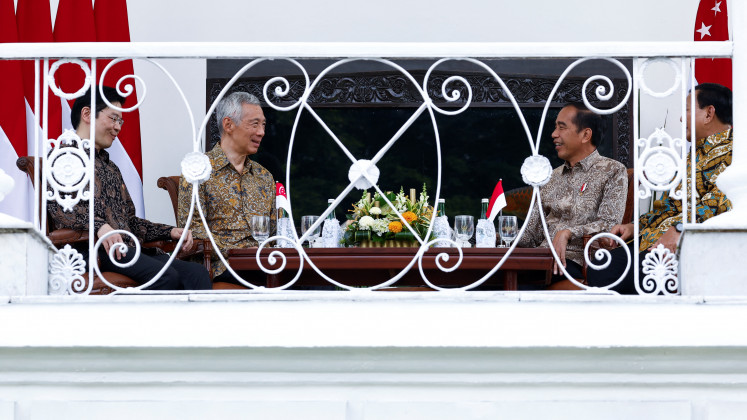Generation Zoom: Freshmen forced to start university life in solitude
The start of the 2020 academic year was like no other, especially for freshmen. There were no nervous handshakes nor greetings when meeting new classmates, nor exciting long walks in busy campus corridors and new classrooms.
Change Size
 Online learning can be done from anywhere, at any time as long as you have internet access. (Shutterstock/File)
Online learning can be done from anywhere, at any time as long as you have internet access. (Shutterstock/File)
The start of the 2020 academic year was like no other, especially for freshmen.
There were no nervous handshakes nor greetings when meeting new classmates, nor exciting long walks in busy campus corridors and new classrooms.
With the COVID-19 pandemic disrupting face-to-face learning, this generation of freshmen has to turn to Zoom, Google Meet and other video conferencing platforms to start their first weeks at university.
Indonesia has more than 4,000 state and private universities, with 98 percent of them applying distance learning during the health crisis, according to the Education and Culture Ministry.
Yusri Hadi Nandika, 17, a freshman at the University of Indonesia, said he cried out of joy after receiving notification of his acceptance to the international relations program at the University of Indonesia in Jakarta in mid-August.
His new life as a freshman began two weeks later from his bedroom in Kendari, Southeast Sulawesi. Yusri has still not been to his campus.
He is holed up in his bedroom, facing his laptop, listening to his lectures and taking notes. His laptop screen was filled with the faces of friends he had never met in real life, he said.
“I’ve never been to Jakarta in my life, nor visited my campus. Everything -- the admission process and paperwork -- was done online,” he said.
His phone was full of updates and assignments from his lecturers sent through WhatsApp. He is part of numerous WhatsApp groups -- each representing either one study course or project, or simply a forum to communicate with fellow students.
Yusri said one thing he was grateful about was that his seniors in the same program warmly welcomed the freshmen, and often personally checked on them just to show that everyone belonged together even though they were not physically present at the campus.
“If the outbreak shows signs of abating, I will definitely fly to Jakarta,” he said, although he was not sure when it was going to end.
Read also: COVID-19 education funds leave much to be desired
In mid-August, Nosa Kurnita, 18, started her freshman year at Petra Christian University in Surabaya, one of the epicenters of the outbreak in Indonesia, with excitement.
She moved from Nabire in Papua to Surabaya two weeks after the academic year started only to get better internet access to join online classes in business management. She lives with her older brother who is also learning remotely from their rented rooming house.
Nosa has still never visited her campus, and participating in online classes while living away from her parents turned out to be hard for her. Although she is familiar with the idea of distance learning, she almost never did it during her high school years in Nabire due to the poor internet connection.
“Long hours of staring at the [computer] screen hurts my eyes. I sometimes simply listen to what my lecturers say in the online sessions rather than looking at the computer screen,” she said.
If she could choose now, Nosa said, she preferred to stay close to her support system in Nabire.
To help new students adapt to college life during the pandemic, the Education and Culture Ministry has reduced university tuition fees and relaxed rules for leave of absence during the pandemic, allowing students who take less than six course credits this semester to pay only half of their tuition fees.
Students in their final year who are not taking course credits no longer need to pay tuition fees.
Read also: Distance learning plan fails to account for poor
The government has also allocated Rp 7.2 trillion (US$532 million) in mobile phone credit and data plans to support distance learning for the nation’s 8 million university students and 250,000 lecturers, as well as primary and secondary school students.
The ministry has registered 78 percent of the university students’ mobile phone numbers and 85 percent of the lecturers’ numbers on their system. Paristiyanti Nurwardani, the secretary of the Higher Education Directorate General, said they would disburse the subsidized 35 gigabytes of monthly internet data per student late this month.
The Indonesian Clinical Psychology Association’s (IPK) COVID-19 team has been looking into data of 14,000 people who went to IPK psychologists in the past six months. The most common issues reported by these patients are linked to learning difficulties with 25.76 percent, stress with 23.87 percent and anxiety with 18.85 percent.
IPK team leader Annelia Sari Sani said that although the pandemic was undeniably an obstacle, it actually gave a great opportunity for the education system to improve the way it helped students to optimize their learning experiences.
“In psychology, university students are called the emerging adults, who are transitioning from a teenager to an adult. Universities often overlook this issue,” she said.
“These young people have to learn to be independent and, therefore, they should not only gain knowledge that was fed by their lecturers. However, the pandemic and online learning could encourage the lecturers to do that.”
She urged lecturers to challenge their students and provide a project-based learning process instead of simply shoving theories down the students’ throats during online learning.
“The pandemic is forcing the education system to make a digital leap in only six months. That is a challenge, but when the situation forces us to do what we haven’t done before, there is no other way but to survive,” Annelia said. “If we take this opportunity to grow and use it optimally, we will have a generation who are resilient, resourceful and independent.”









